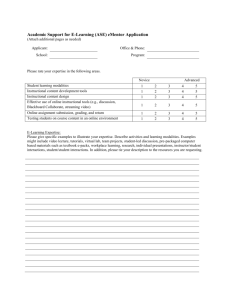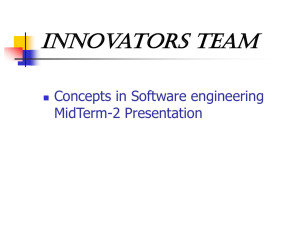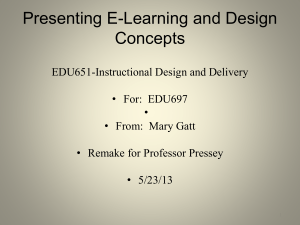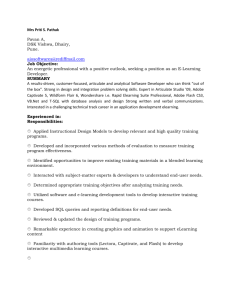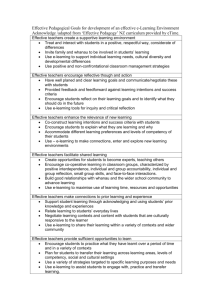File
advertisement
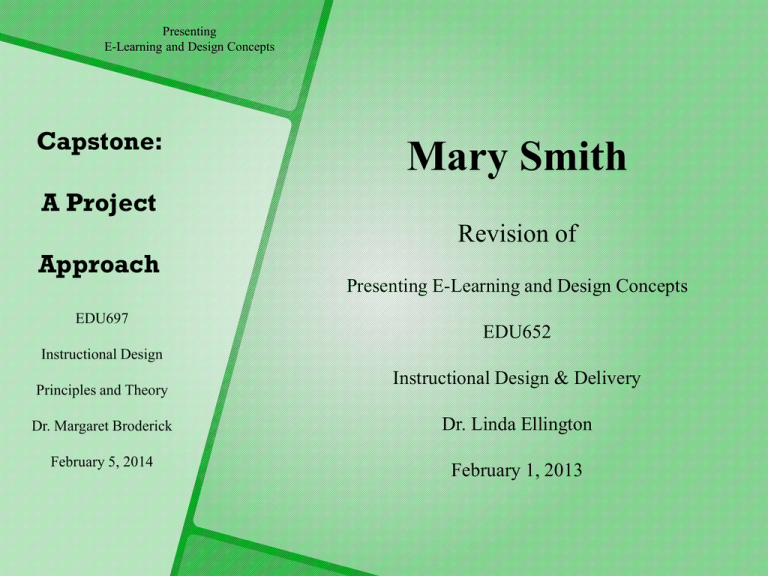
Presenting E-Learning and Design Concepts Capstone: Mary Smith A Project Revision of Approach Presenting E-Learning and Design Concepts EDU697 EDU652 Instructional Design Principles and Theory Instructional Design & Delivery Dr. Margaret Broderick Dr. Linda Ellington February 5, 2014 February 1, 2013 • • • • • • Define e-learning and describe the varieties of e-learning Explain e-learning design and instructional design Discuss design perspectives and influences Discuss the alignment of learning goals and objectives Examine the selection of teaching sequences Analyze the selection of learning activities e-Learning Describe the varieties of e-learning Learning Games and Simulations Word puzzle Quiz-show game Math simulation Software simulation Learning Games and Simulations Learning by performing simulating activities that exploration and lead to discoveries Mobile Learning Mobile Learning Devices Learning from the world while moving about the world. Accomplished by a mobile device for instance cell phone and tablet Social Learning Social Learning Learning through interaction with the community of expert and fellow learners. According to William Horton (2012) communication among participants relies on socialnetworking media such as online discussions, blogging and text messaging. Varieties of e-Learning E-Learning Live Ashford University Student Portal Virtual-Classroom Courses – is online classes structured much like a classroom course, with reading assignments, presentations discussion via forums and other social media and homework Virtual-Classroom Courses E-learning design is decision. Design governs what we do. Design involves judgment, compromise, tradeoff and creativity e-Learning Design Instructional Design Translate the high-level project goals to choices for technology, content, and everything else. Instructional Design • the appropriate selecting that involves mixture of graphics, text, music, voice, video, animation, and sound effects. We must use sequence these various media and synchronize complement ary media. Economic • Helps us build reliable computer programs. It runs on the computer, just as a spreadsheet or word processor. Software engineering contributes the concepts of object design, usability design and rapid prototyping. Media Design Software Engineering Instructional Design • The process by which teaching is enhanced through the investigation of learning needs and organized development of learning materials. Instructional designers often use technology and multimedia as tools to enhance teaching. • e-learning cost money and it may generate revenue. It takes time, people and resources to create, offer, and maintain. It must be delivered under a budget and on schedule. Design Perspectives and Influences Alignment of Learning Goals And Objectives Discuss the alignment of learning goals and objectives GOALS What really matters to your organization How will your project contribute Learn all about your learners Create Decide & Do Believe Alignment of Learning Goals and Objectives R e f e r e n c e Cognitive Design Solutions. (2005). E-Learning Retrieved from http://www.cognitivedesignsolutions.com/ELearning/ELearning1.htm Gogos, Roberta. (2012, September 16). eLearning resources from efront blog: What is social learning? Retrieved from http://blog.efrontlearning.net/2012/09/whatis-social-learning.html Horton, W. (2012). E-Learning by design (2nd ed.). San Francisco, CA: Wiley Slope Analysis Group. (n.d.). Slope analysis – GALENA Retrieved from http://www.slope-analysis.com/index.html William Horton Consulting. (2011). Using Gantt charts Retrieved from http://www.horton.com/portfoliogantt.htm California Polytechnic State University (2014). Academic Programs and Planning Retrieved from http://www.academicprograms.calpoly.edu/content/whowear e/index
